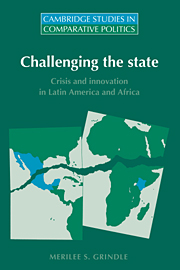Book contents
- Frontmatter
- Contents
- List of figures
- List of tables
- Acknowledgments
- 1 Challenging the state: a decade of crisis
- 2 Crisis and the state: evidence from Latin America and Africa
- 3 Crisis and breakdown in Mexico and Kenya
- 4 Imposing state authority
- 5 Managing the economy
- 6 Administering the public good
- 7 Responding to society
- 8 States of change
- Notes
- References
- Index
7 - Responding to society
Published online by Cambridge University Press: 27 August 2009
- Frontmatter
- Contents
- List of figures
- List of tables
- Acknowledgments
- 1 Challenging the state: a decade of crisis
- 2 Crisis and the state: evidence from Latin America and Africa
- 3 Crisis and breakdown in Mexico and Kenya
- 4 Imposing state authority
- 5 Managing the economy
- 6 Administering the public good
- 7 Responding to society
- 8 States of change
- Notes
- References
- Index
Summary
Capable states must be responsive to citizen needs and demands. They must provide channels for interests to be represented in decision making and in monitoring the behavior of public officials. They must allow for societal participation in the allocation of public resources and the mediation of economic and political conflict. This political capacity differs from institutional capacity in that it deals not with the authoritativeness of broad rules of the game or with their normative content, but with the everyday interactions between citizens and public officials and the ability of civic society to demand access to the state, its officials, and its decision-making processes.
Capable states do not necessarily require democracy, but regimes must be able to receive, process, and satisfy at least some citizen demands for responsiveness, representation, and participation or they will either be short-lived or need to expend considerable resources on coercive activities to remain in power. In fact, states have an inherent interest in acquiring and maintaining political capacity because it is central to their security concerns. In practice, most governments treat the allocation of public resources at least in part as a way of maintaining the social peace among diverse interests in society and the stability and coherence of coalitions supporting the regime or the administration in power.
- Type
- Chapter
- Information
- Challenging the StateCrisis and Innovation in Latin America and Africa, pp. 155 - 179Publisher: Cambridge University PressPrint publication year: 1996



